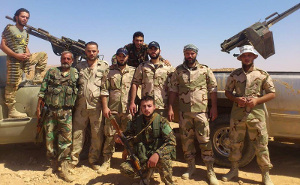While a lot of the focus of fighting between ISIS and Assad government forces in Syria has been around Palmyra, the bigger near-term story is the Syrian military’s offensive against the last ISIS-held town in Aleppo Province, the strategically important Maskaneh.
 Syrian Army forces over the weekend secured the mountainous area of Maskaneh, and dozens of nearby villages, effectively expelling ISIS from Aleppo, and more importantly, greatly securing their hold over the main road that connects the city of Aleppo to the capital of Damascus.
Syrian Army forces over the weekend secured the mountainous area of Maskaneh, and dozens of nearby villages, effectively expelling ISIS from Aleppo, and more importantly, greatly securing their hold over the main road that connects the city of Aleppo to the capital of Damascus.
This loss likely sets the stage for more Syrian Army pushes into the northern part of Hama, to fight with both ISIS forces and other Islamist factions in that area. An offensive in this area would allow them to surround the Idlib Province, the last major stronghold of al-Qaeda forces and several other rebel factions.
Though invading Idlib itself is likely all but impossible at this point, given how many rebels were already there, and how many others have been evacuated into the area, the Assad government seems to be making an effort to secure all the areas bordering it, which would allow them to effectively contain these groups and shift focus to ISIS.
This time last year, ISIS controlled most of the Aleppo Province, but lost much of it to a Turkish invasion, and has ultimately lost the rest of the Syrian Army itself. This splits the province between the Assad government and Turkey-backed rebel forces.


